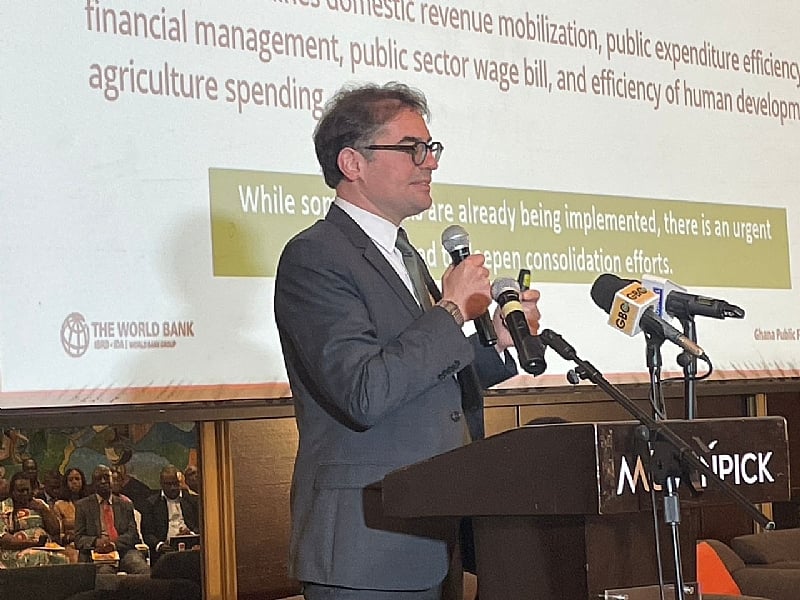The World Bank Group has emphasized the need for Ghana to pursue comprehensive fiscal reforms to build a resilient and equitable fiscal system.
In its latest Public Finance Review report, titled “Building the Foundations for a Resilient and Equitable Fiscal Policy,” the bank highlights how Ghana’s impressive annual GDP growth of 6.8% between 2008 and 2019 was largely driven by oil production and debt accumulation, leaving the country vulnerable to external shocks.
According to the report launched in Accra on Wednesday, February 12, the recent debt crisis in Ghana was triggered by weak expenditure controls, inefficient public spending, underperforming revenue collection, and high-cost borrowing.
Recognizing that the country has made significant efforts to stabilize its economy since 2022, the World Bank stressed the need for these efforts to be complemented with long-term structural reforms to address the root causes of the crisis and promote sustainable development.
“Ghana needs to persist in its ambitious fiscal consolidation efforts, ensuring that adjustments are both fair and sustainable,” said Robert Taliercio, World Bank Country Director for Ghana, Liberia, and Sierra Leone.
Addressing a gathering of media and stakeholders, Taliercio added, “It is crucial to protect pro-poor and pro-growth investments while enhancing domestic revenue mobilization. Additionally, Ghana must address the rising fiscal liabilities from the energy and cocoa sectors.”
The Public Finance Review reveals that Ghana’s fiscal deficit averaged 4% of GDP from 2008 to 2019—twice the 2% average recorded from 2000 to 2007.
Over the same period, public expenditure surged to 19% of GDP, six percentage points higher than in the earlier years, the report adds.
On his part, David Elmaleh, Senior Economist and lead author of the report, stressed the need for institutional strengthening to support fiscal consolidation in the country.
“To achieve lasting stability, Ghana must strengthen its fiscal institutions and improve public financial management and procurement systems. This includes implementing a fiscal rule to ensure debt sustainability and improving transparency through timely access to fiscal data and greater independence of the Fiscal Council,” he said.
The World Bank proposes four key policy priorities to help Ghana address its macroeconomic imbalances and lay the foundation for long-term development.
These include fiscal discipline and oversight, effective revenue mobilization, financing mix management, and prioritizing investment in human development.
Speaking on behalf of the Minister for Finance, Dr. Cassiel Ato Forson, a representative from the Ministry said, “This Public Finance Review comes at a crucial moment with a transition in government when we seek to implement far-reaching reforms to strengthen public financial management, improve expenditure efficiency, and boost domestic revenue mobilization.
“These efforts are not just about addressing current fiscal challenges but also about positioning Ghana’s economy on a path of sustainable and inclusive growth in the years ahead. Ghana’s journey toward development has been characterized by remarkable achievements and formidable challenges.”


